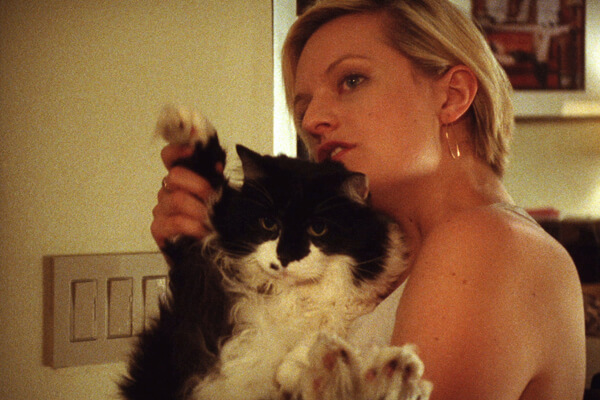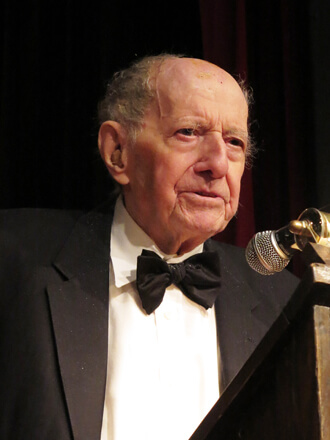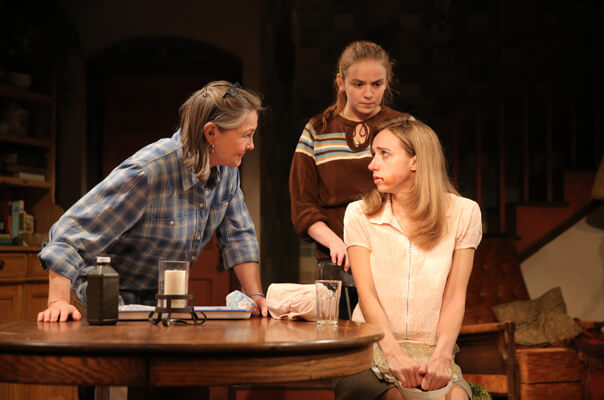The nature of truth is an ongoing, fraught debate in our troubled political times. So it’s no surprise the topic is on the boards. “Network” looked at the nature of news and the dichotomy between journalism as factual reporting and as an entertainment business.
“The Lifespan of a Fact,” now winding down its run at Studio 54, questions whether factual accuracy should get in the way of a good story. When a story is a product, profit is the motive, and competition is intense, the truth and presumably ethics suffer. To reach a big audience, you have to “give ‘em what they want.”
John, an award-winning writer, is known for the bending of facts to achieve a literary end, yet his approach has put him in good standing in the past. So well, in fact, that Emily, the editor at a struggling high end magazine, wants John’s story on a teen’s suicide to be her cover, rather than a fatuous piece on congressional wives. But Emily is on deadline, and she needs the piece fact-checked pronto. Enter Jim, an earnest intern, eager to prove himself. He takes on the project, with the promise of turnaround in 72 hours.
While Emily thinks, perhaps hopes, that Jim will do a cursory job so the piece will be ready in time, Jim proves to be a latter-day Diogenes, tirelessly tracking down every point in the piece. Jim’s insistence on accuracy touches off a tetchy three-way battle that throws art, commerce, and truth into the arena in a deathmatch. John wants his literary storytelling. Emily wants a strong piece and plausible deniability for any errors that slip in. Jim wants the truth.
For all the seriousness of the subject matter, though, the play is at heart a somewhat frothy comedy. To be sure, much of the humor comes from Jim’s terrier-like tenacity on each individual fact — he comes up with more than one hundred queries in the article’s first page — and the issue all three are left to ponder is whether if one fact is wrong the veracity of the entire piece is called into question. The audience is left to ponder that quandary, as well, since no definitive resolution is offered.
The production, under the witty and sharp direction of Leigh Silverman, is a quick 85 minutes, and the performances by the three stars are perfectly rendered. Cherry Jones is Emily in another focused and wonderfully economical performance. She has both her own issues and is the referee in the battle between Jim and John. Bobby Cannavale is excellent a John, with a brashness that somewhat masks an artist’s vulnerabilities. Daniel Radcliffe is simply great as Jim. With an American accent and a ferocious dedication to the job and the truth, he proves himself an equal combatant against the two older and more established characters. The three play very well together.
Narrative journalism remains a questionable genre. Just days after I saw this show, the much-awarded German writer Claas Relotius was forced to return his awards for publishing at least 14 false articles in Der Spiegel with “facts” entirely made up to serve the stories, provoking questions about all of the respected magazine’s reporting. Perhaps if they had had Jim on the case, it might have worked out differently.
In “The Hard Problem,” Tom Stoppard’s new play at Lincoln Center, the problem is not so much presenting a debate about the brain as the biological organism running the human body versus its role in making us feel, recognizing moral standards, and giving us what we call our humanity — but rather how to make a good play out of all of that. It’s a problem that Stoppard fails to solve. There is a lot of talking and philosophical argument about artificial intelligence, the nature of goodness, and what guides our actions, and that is all juxtaposed against a contrived and sentimental story about a baby given up for adoption that has an all-too-facile resolution. The result is meandering and unformed.
The game cast under the direction of Jack O’Brien does what they can with this, starting from the fairly meta positioning of the theater as a think tank. The cast come out on stage with scripts in hand, look at the audience, snap their books shut, and dive into the first scene. Rather than theatrical, that feels like a way of excusing what’s to follow. As it gets rolling, the arguments trip over each other and the characters are just superficial sketches in service of ideas. There’s consequently no way for an audience to care about what’s at stake for them. If we can’t connect with the characters, why should we invest in their arguments? This ultimately blunts Stoppard’s intent, and the question of whether goodness is learned or inherent is left to spin on unresolved in academic circles. Unfortunately, none of this plays particularly compellingly on the stage.
It’s always thrilling to watch Tyne Daly work. She is an actress who can fill any moment with complexity, humanity, and deep insights into the character she plays. That thrill is about all there was in Theresa Rebeck’s new play “Downstairs,” which just closed at the Cherry Lane.
This is a play that doesn’t know what it wants to be. Is it a family drama where the past is dragged up by siblings suddenly cast together after a long separation? Or is it a psychological thriller about an abused wife who uncovers her husband’s dark secret. Rebeck tries to have it both ways, but here that doesn’t work. It feels as though the family drama has been shoehorned into the script in order to eke out a superficial thriller.
To her credit, Daly commits fully to both elements in the plot. She tries to care for her damaged brother who has been living in her basement rather than on the streets. She listens, soothes, and does what she can to heal the injuries of the past. In the story as thriller, she finally finds her voice to strike back against a lifetime of oppression from her sociopath husband.
The roles of the brother Teddy and husband Gerry are one-dimensional, but Tim Daly — Tyne’s real life brother — and John Procaccino are effective. Procaccino can be especially harrowing, though his role as husband is written as a fairly stock psycho villain.
Either story Rebeck tries to tell might have been interesting on its own merits. After all, who doesn’t love a good family drama with dark secrets revealed? And most people are game for a classic thriller. But forced together, they are neither one nor the other. Still watching Tyne Daly in the intimate Cherry Lane Theatre was ample compensation.
LIFESPAN OF A FACT | Studio 54, 254 W. 54th St. | Through Jan. 13: schedule varies | $49-$189 at telecharge.com or 212-639-6200 | Eighty-five mins.; 85 min., no intermission
THE HARD PROBLEM | Mitzi Newhouse Theater, Lincoln Center | Through Jan. 6: Tue.-Sat. at 8 p.m.; Wed., Sat. at 2 p.m.; Sun. at 3 p.m. | $92 at telecharge.com or 212-639-6200| One hr., 40 mins., no intermission



































